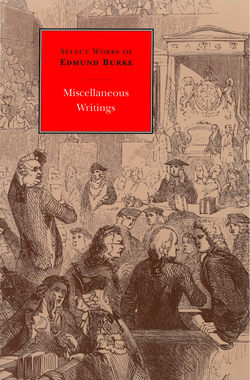Читать книгу Miscellaneous Writings - Edmund Burke - Страница 15
На сайте Литреса книга снята с продажи.
ОглавлениеTWO LETTERS TO GENTLEMEN IN BRISTOL ON THE TRADE OF IRELAND
[April 23 and May 2, 1778]
After the British defeat at Saratoga in 1777, Lord North’s administration came to believe that concessions would have to be made not only to the rebellious American colonies but to Ireland as well. Great Britain and Ireland at this time were legally distinct kingdoms, under a common crown, but with separate legislatures and governing bodies (though in fact the British government kept the Irish one firmly under its thumb). Ireland chafed under the restrictions that British legislation placed on the export of Irish goods to Great Britain, and was becoming restive. Lord North therefore acquiesced when Earl Nugent (an Irish lord and member of the British House of Commons) introduced bills in the Commons in April 1778 to eliminate or reduce some of these restrictions on Irish trade. Burke enthusiastically supported them, even though he and his party, the Rockingham Whigs, were in opposition to the government.
The response from the manufacturing and trading cities of England was an angry one, not least from Burke’s constituency of Bristol, which was then the second greatest port of the kingdom. His constituents let him know that by his support of these measures in favor of freeing Irish trade, he was in danger of losing his seat at the next election, as in fact he did in 1780, though not entirely for this reason.
One of the letters of protest sent to Burke was from Samuel Span, Master of the Society of Merchant Adventurers of Bristol. Another was from Harford, Cowles and Co., a firm of iron manufacturers. Burke wrote replies to these letters and published them in this pamphlet on May 12, 1778. In it he rejected the mercantilist assumption that trade was a zero-sum game in which what Ireland gained Britain necessarily lost. His strategy, however, was typically Burkean, as he explained in a letter after the struggle was over (Works 9:235–36): “I was in hopes that we might obtain, gradually, and by parts, what we might attempt at once and in the whole without success; that one concession would lead to another; and that the people of England, discovering, by a progressive experience, that none of the concessions actually made were followed by the consequences they had dreaded, their fears from what they were yet to yield would considerably diminish. But that, to which I attached myself the most particularly, was to fix the principle of a free trade in all the ports of these Islands, as founded in justice, and beneficial to the whole; but principally to this, the seat of the supreme power.”
